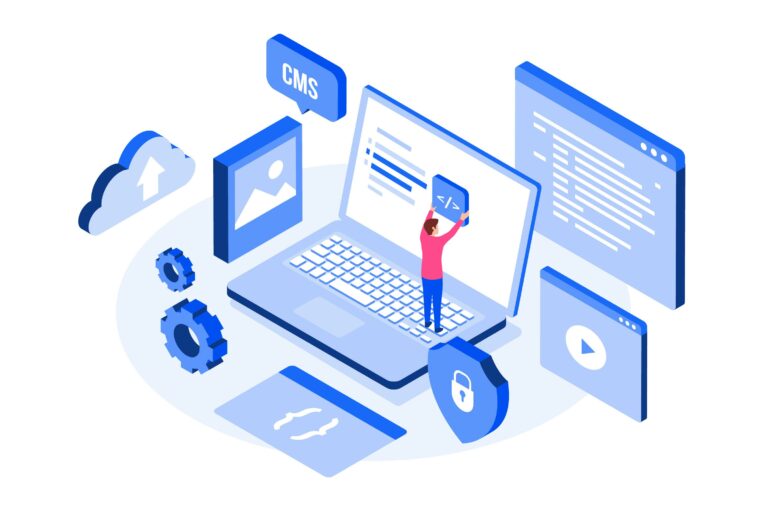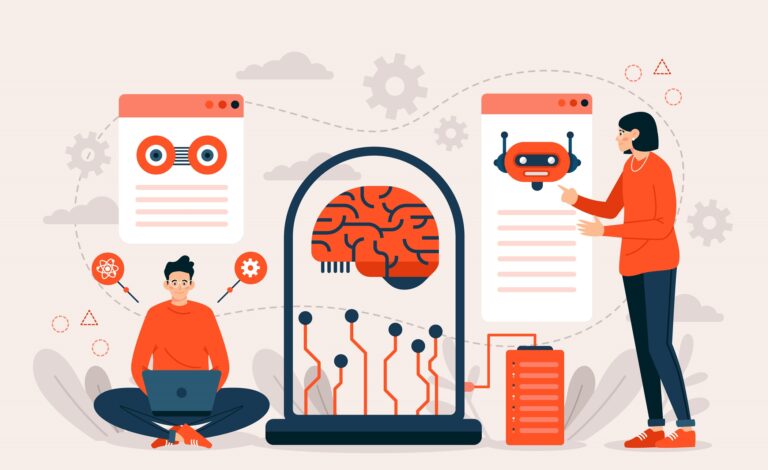How to Implement AI in Your Marketing Strategy
In this comprehensive guide, we explore the crucial role of artificial intelligence in enhancing modern marketing strategies. From setting objectives and audience segmentation to content creation, personalization, social media marketing, predictive analysis, marketing analytics, cost implications, and overcoming implementation challenges, we cover every aspect of integrating AI into your marketing endeavors. This guide not only aims to equip you with a practical understanding of using AI for marketing but also provides insights into the future trends of AI in marketing strategy, equipping you for a data-driven and AI-powered marketing future.
I. Introduction
The intersection of artificial intelligence and marketing represents an exciting frontier for businesses looking to leverage technology to better reach and serve their customers. But, what does it mean to use AI in the context of marketing? Let’s delve into that.
A. Defining AI in the Context of Marketing
AI, in essence, is a branch of computer science that involves the development of machines or software capable of demonstrating behaviors typically requiring human intelligence. These behaviors may include learning, reasoning, problem-solving, perception, and language understanding.
In the context of marketing, AI can take many forms, ranging from chatbots that provide customer service, to sophisticated algorithms that analyze vast amounts of consumer data to predict buying behaviors. AI is all about automating tasks that traditionally required human intellect, thereby allowing marketers to focus more on strategy and creativity.
B. The Importance of AI in Modern Marketing
In an increasingly digital world, the value of AI in marketing cannot be overstated. The integration of AI into marketing strategies is changing the game, enabling businesses to provide personalized experiences, make data-driven decisions, and engage with customers in more meaningful ways.
AI can process and analyze data at a scale impossible for humans, delivering insights that inform strategic decisions, improve marketing effectiveness, and increase ROI. Moreover, it can automate repetitive tasks, allowing marketing teams to dedicate their time to higher-value activities. Thus, AI is no longer just a ‘nice to have’ in the marketing world; it’s rapidly becoming a necessity for any business looking to stay competitive.
II. Setting Your Marketing Objectives
Before diving headfirst into the world of AI-driven marketing, it’s crucial to have a clear understanding of your marketing objectives. This involves identifying what you hope to achieve with your marketing efforts and understanding how AI can support you in achieving those goals.
A. Identifying Your Marketing Goals
The first step towards implementing AI in your marketing strategy is to define your marketing goals. Are you aiming to increase brand awareness? Drive more traffic to your website? Improve customer retention? Your marketing objectives will guide your AI implementation strategy, so it’s important to be as specific as possible.
For instance, if your goal is to enhance customer engagement, you might consider using AI to deliver personalized content and recommendations. If your aim is to improve your email marketing campaigns, AI can help you optimize your email subject lines and content to improve open rates.
B. Understanding How AI Can Support Your Goals
Once you have clearly defined your marketing goals, the next step is to understand how AI can support these objectives. The beauty of AI lies in its versatility. Regardless of your specific goals, there’s likely an AI solution that can help.
For example, if one of your objectives is to improve customer segmentation, AI algorithms can analyze customer data to create more precise and granular segments. If your goal is to optimize your advertising campaigns, AI can help by analyzing campaign performance data in real-time and adjusting your ad spend accordingly.
AI can not only support your current marketing goals but also enable new ones. By leveraging the power of AI, you can explore new marketing techniques, such as predictive advertising, dynamic pricing, and real-time personalization, which can help you achieve more advanced objectives.
Therefore, having a firm understanding of your marketing goals and an appreciation for how AI can support those objectives is an important preparatory step in integrating AI into your marketing strategy.
III. AI in Audience Segmentation and Targeting
AI has revolutionized the way marketers approach audience segmentation and targeting. With AI, businesses can understand their audience on a much deeper level, leading to more effective and personalized marketing strategies. In this section, we’ll explore how AI aids in audience segmentation and enhances targeting strategies.
A. The Role of AI in Audience Segmentation
Audience segmentation has always been a crucial part of any marketing strategy. It involves dividing a broad target market into subsets of consumers with similar needs, interests, and behaviors. However, AI has taken audience segmentation to new heights, transforming it from a manual, time-consuming process into a precise, efficient, and automated one.
AI algorithms can analyze vast amounts of customer data, identify patterns and trends, and create highly detailed customer segments. These can be based on various factors, such as demographic data, online behavior, purchase history, and more.
For instance, AI can help identify high-value customers, those who are more likely to engage with the brand, or even those who might be at risk of churning. Such insights allow marketers to target their audience more effectively and create personalized marketing campaigns that resonate with each segment.
B. How AI Enhances Targeting Strategies
AI also plays a pivotal role in enhancing targeting strategies. By using AI-powered tools, marketers can reach the right customer, at the right time, with the right message.
Predictive analytics, a facet of AI, can anticipate customer behavior, enabling marketers to target consumers proactively. For example, AI can predict when a customer might be ready for a product upgrade, or when they might be in need of a specific service, allowing businesses to tailor their marketing messages accordingly.
Moreover, AI can help in real-time personalization, enabling marketers to customize marketing messages based on real-time user behavior. For instance, if a user shows interest in a specific product category on a website, AI can instantly tailor the website content, recommendations, and ads to reflect that interest.
By using AI in audience segmentation and targeting, businesses can create more effective and relevant marketing strategies that lead to higher customer engagement, conversion rates, and ROI.
IV. AI and Content Creation
Content is king in the realm of digital marketing, but creating and distributing it can be a massive undertaking. Artificial Intelligence can step in to streamline these processes, and in this chapter, we’ll discuss how AI plays a crucial role in content generation and distribution.
A. The Use of AI in Content Generation
Artificial Intelligence has opened up new avenues for content creation. AI-powered tools can now generate a variety of content, from product descriptions and email subject lines to social media posts and blog articles. These tools leverage Natural Language Generation (NLG) technology to convert structured data into human-like text.
While AI-generated content might not fully replace the depth and creativity that human writers bring, it can definitely help in creating first drafts, generating content ideas, or creating simple content pieces at scale. This frees up valuable time for human marketers to focus on more strategic tasks.
AI also shines in content optimization. AI-powered tools can analyze huge datasets to identify which content types, lengths, formats, and styles resonate best with your audience. By using these insights, marketers can create more impactful content that drives engagement and conversions.
B. Automating Content Distribution with AI
AI not only helps in creating content but also in distributing it. Content distribution is a critical part of a marketing strategy; after all, even the best content won’t make an impact if it doesn’t reach the right audience at the right time.
AI can optimize content distribution by analyzing user behavior data and identifying the best times to post, the most effective channels, and the most engaging formats. By automating the distribution process, AI ensures that your content reaches your target audience when they’re most likely to engage.
Furthermore, AI can help in automating content personalization for different platforms. For example, AI tools can automatically resize images, adjust content lengths, or tweak language to suit different social media platforms, email campaigns, or website layouts.
Incorporating AI into your content strategy can enhance the efficiency and effectiveness of your content creation and distribution, leading to better audience engagement and a higher marketing ROI.
V. AI in Personalized Marketing
In the age of information overload, personalization has become key to standing out and making an impact. AI takes personalization to a new level, enabling marketers to tailor marketing messages and campaigns to each customer’s unique needs and preferences. Let’s delve into how AI makes this possible.
A. Personalizing Marketing Messages with AI
Generic, one-size-fits-all marketing messages don’t cut it anymore. Today’s consumers expect brands to understand their individual needs and offer personalized experiences. This is where AI comes in.
AI, combined with Machine Learning (ML), can analyze vast amounts of customer data, such as browsing history, past purchases, and demographic details, to understand each customer’s preferences and behaviors. Based on this understanding, AI can generate personalized marketing messages that resonate with each individual customer. Whether it’s a personalized email, a product recommendation, or a targeted ad, AI can help deliver the right message at the right time to the right person, enhancing engagement and conversions.
Furthermore, AI can use predictive analysis to anticipate future customer behavior based on past data. This allows marketers to personalize not just current but also future marketing messages, staying a step ahead of customer needs.
B. AI for Personalized Marketing Campaigns
AI’s personalization capabilities don’t stop at individual messages; they extend to entire marketing campaigns. AI can help design and execute marketing campaigns tailored to specific customer segments or even individual customers.
For example, AI can help create personalized landing pages that change based on who’s viewing them. These dynamic landing pages can feature products, offers, or content that the specific visitor is most likely to be interested in, based on their past behavior and other data.
AI can also automate the process of A/B testing different campaign elements such as headlines, images, or call-to-actions, learning from each interaction to continuously improve the campaign performance.
Furthermore, AI can enhance retargeting efforts, helping marketers reach customers who have shown interest in the brand but haven’t converted yet. AI can analyze the behavior of these customers to understand why they didn’t convert and tailor retargeting campaigns to address these reasons, increasing the chances of conversion.
By personalizing marketing messages and campaigns, AI not only improves customer engagement and conversion rates but also enhances customer loyalty by making customers feel understood and valued.
VI. AI and Social Media Marketing
Social media is a vital part of any modern marketing strategy, with its ability to connect brands directly with their audience. But with the vast amount of data generated on social media, it can be challenging to make sense of it all and use it effectively. AI can step in to transform your social media marketing, from strategy creation to tool selection.
A. Leveraging AI in Social Media Strategies
Social media isn’t just about posting content and hoping it sticks. It requires strategic planning and execution, which can be greatly enhanced by AI.
AI can analyze social media data to identify trends and patterns, such as what content your audience engages with the most, what times they’re most active, and even what tone of voice resonates with them. This insight can inform your social media strategy, helping you create content that’s more likely to engage your audience and post it at the optimal times for visibility.
Furthermore, AI can monitor social media conversations to provide real-time insights. Whether it’s tracking brand mentions, understanding customer sentiment, or identifying emerging trends, AI can provide valuable information that allows you to react promptly and appropriately, keeping your brand relevant and your audience engaged.
AI can also aid in social media advertising. By analyzing user behavior and demographic data, AI can help create highly targeted ads that are more likely to resonate with and convert your audience. Additionally, AI can optimize your ad spend by determining the most effective platforms and times for your ads.
B. AI Tools for Social Media Marketing
Numerous AI tools are available to help you harness the power of AI in your social media marketing.
Social listening tools use AI to monitor social media conversations about your brand, your competitors, and your industry. They can provide insights into customer sentiment, trending topics, and influential figures in your industry, helping you understand the social media landscape and make informed decisions.
Content creation tools can use AI to generate social media content based on your brand’s voice and your audience’s preferences, taking some of the creative burdens off your team.
Social media management tools can use AI to schedule posts at optimal times, analyze post performance, and suggest content improvements.
AI chatbots can handle customer queries and engage with users on social media, providing immediate and personalized responses. They can also collect user data during these interactions, providing further insight into your audience.
All these AI tools can supercharge your social media marketing, helping you create more effective strategies, produce more engaging content, and foster stronger connections with your audience.
VII. AI in Predictive Analysis for Marketing
Predictive analysis has become a game changer for marketers across the globe. With its ability to sift through massive data sets and identify patterns, trends, and potential outcomes, it offers a powerful way to stay ahead of the game. Let’s delve into how artificial intelligence fits into this and can revolutionize your marketing efforts.
A. The Power of Predictive Analysis in Marketing
Predictive analysis is the practice of using statistical algorithms and machine learning techniques to predict future outcomes based on historical data. In marketing, predictive analysis can be a gold mine of information, empowering marketers to foresee customer behaviors, trends, and market developments.
For instance, predictive models can forecast which customers are likely to churn, which products a customer is likely to buy next, or how successful a particular marketing campaign will be. This forward-looking insight allows marketers to proactively adjust their strategies, optimize their resources, and make more informed decisions.
In essence, predictive analysis provides marketers with a sort of crystal ball. However, the crystal ball is only as good as the quality and quantity of the data fed into it, and this is where AI comes into play.
B. Implementing Predictive Analysis using AI
AI can supercharge your predictive analysis in several ways.
Firstly, AI algorithms can process vast amounts of data much more quickly and accurately than human analysts. They can handle unstructured data, such as social media comments or customer reviews, which traditional analytics tools might struggle with. This ability means AI can provide a much more comprehensive and accurate view of your data, making your predictions more reliable.
Secondly, AI can learn and improve over time. AI algorithms use machine learning to refine their predictions as more data becomes available. This continuous learning means your predictive analysis can become more precise over time, continually enhancing your marketing strategy.
Thirdly, AI can automate much of the predictive analysis process. From data collection to model creation to prediction generation, AI can handle the heavy lifting, freeing your team up to focus on using the insights generated to drive your marketing strategy.
To implement predictive analysis using AI, start by identifying the specific outcomes you want to predict. Then, gather and clean your data, ensuring it’s as accurate and complete as possible. Choose an AI tool that fits your needs and abilities – many user-friendly, AI-powered predictive analytics tools are available today. Train your AI tool on your data, then test and refine your models. Once you’re satisfied with your models’ accuracy, you can start using them to predict future outcomes and inform your marketing decisions. Remember, implementing predictive analysis is not a one-time thing; it requires ongoing effort to maintain data quality, monitor model performance, and adjust as necessary. But with the potential benefits, it’s well worth the investment.
VIII. Implementing AI in Marketing Analytics
Analytics forms the backbone of any successful marketing strategy. It’s through the scrutiny of data that marketers can derive meaningful insights and make informed decisions. However, as data volumes continue to explode, the ability to manually analyze and derive insights from such data has become an increasingly daunting task. This is where Artificial Intelligence, with its power to quickly process and analyze large volumes of data, becomes invaluable. Let’s explore this further.
A. Role of AI in Marketing Analytics
Artificial Intelligence, in the context of marketing analytics, is a technological game-changer. It introduces the ability to quickly sift through complex and large datasets, identify trends and patterns, and present digestible insights to marketers.
AI’s primary role in marketing analytics involves predictive analysis, customer segmentation, churn prediction, lifetime value prediction, and customer behavior analysis. It is also invaluable in real-time decision-making, allowing for dynamic pricing and real-time personalization, among other benefits.
Moreover, AI helps in dealing with unstructured data, such as social media feeds, images, or voice data, which form a significant part of modern marketing data. Traditional data analysis methods often fall short in dealing with this type of data, but AI, with tools like Natural Language Processing (NLP) and Image Recognition, can effectively decode and analyze such data for actionable insights.
B. Effective Use of AI in Analyzing Marketing Data
To effectively use AI in analyzing marketing data, you must begin with a clear understanding of your business objectives. What insights are you looking to gain from your data? Once this is clear, you can determine which AI tools and techniques are best suited to achieve these goals.
Invest in AI tools that are designed for marketing analytics. Many platforms today offer user-friendly, AI-powered analytics tools that can perform tasks ranging from predictive analysis to customer segmentation to sentiment analysis. Ensure that the tool you choose can handle the type and volume of data you’re dealing with.
Also, it’s crucial to maintain the quality of your data. Even the most powerful AI tool can’t derive meaningful insights from poor-quality, inaccurate, or incomplete data. Hence, data cleaning and management should be a critical part of your analytics strategy.
Lastly, remember that AI is a tool, not a magic wand. While it can provide valuable insights, the interpretation and application of these insights still rely on human judgment. Hence, ensure your team is equipped with the skills and knowledge to leverage AI-driven insights effectively.
In a nutshell, implementing AI in marketing analytics can open up a world of possibilities. It can equip marketers with the ability to navigate the complexities of modern marketing data and derive meaningful, actionable insights. But like any tool, its effectiveness depends on how well it’s understood and utilized. With the right approach, AI can indeed be a powerful ally in your marketing journey.
IX. Understanding the Cost Implications of AI Implementation
Investing in AI for marketing isn’t just about purchasing software. It’s a strategic decision that involves cost considerations, not only for the acquisition of the AI tools but also for implementation, maintenance, training, and potential upgrades. While AI offers immense potential benefits, understanding the cost implications is crucial to ensure a favorable return on investment (ROI). Let’s delve deeper into this.
A. Evaluating Costs of AI Tools for Marketing
The costs of AI tools for marketing can vary significantly based on several factors. These include the complexity of the tool, the scope of its features and capabilities, the provider’s pricing model, and any costs associated with implementation and integration.
Some AI tools may be subscription-based with monthly or annual fees, while others might require a significant upfront investment. Additionally, there could be costs related to customization, if you require the tool to be tailored to your specific needs.
Another crucial factor to consider is the cost of training. AI tools can be complex, and your team may require training to utilize them effectively. This can incur additional costs, both in terms of money for the training and time spent by your employees in learning to use the tools.
Also, don’t forget about the costs associated with maintenance and potential upgrades. AI is a rapidly evolving field, and to stay relevant, tools often require regular updates, which might come at an extra cost.
B. Calculating ROI on AI Implementation in Marketing
The return on investment for AI in marketing can be quantified in several ways, depending on your objectives. However, it generally involves evaluating the monetary value of the improvements that the AI tool brings about, compared to its cost.
Key areas to consider when calculating ROI include:
- Efficiency Gains: AI can automate many marketing tasks, saving your team time that can be spent on other strategic activities. This improved efficiency can be converted into monetary terms based on the cost of labor saved.
- Increased Revenue: If the AI tool helps improve your marketing effectiveness, leading to increased sales or customer retention, this can directly contribute to increased revenue.
- Improved Decision-Making: AI-driven insights can lead to better marketing decisions, which can result in more effective campaigns and higher ROI. While this can be difficult to quantify, it’s an important consideration.
When calculating ROI, remember to account for all costs associated with the AI tool, including purchase, implementation, training, maintenance, and upgrades. By comparing these costs with the benefits, you can get a clearer picture of whether your investment in AI is paying off.
AI can be a substantial investment, but when appropriately implemented, it can provide a significant return. The key is to understand the costs and benefits thoroughly to make an informed decision.
X. Overcoming Challenges in AI Implementation
Just like any technological change, implementing AI into your marketing strategy comes with its unique set of challenges. These can range from data privacy issues to user resistance, integration complexities, or even ethical considerations. However, with the right approach, these hurdles can be navigated successfully. Let’s explore how.
A. Identifying Potential Hurdles in AI Adoption
In order to plan for and overcome challenges in AI implementation, you first need to identify what those challenges might be. Here are some common hurdles businesses face when adopting AI:
- Technical Integration: Integrating AI into existing systems can be a complex task, requiring considerable technical expertise. You might need to update or even overhaul your current systems to make them compatible with the new AI tools.
- Data Privacy: AI applications often rely on large amounts of data for their operations. This poses questions about data privacy and protection, which are paramount in today’s digital age. Complying with regulations like GDPR or CCPA can add an extra layer of complexity.
- User Resistance: People can be resistant to change, especially when it involves learning new technologies. This resistance can slow down AI adoption and hinder its effectiveness.
- Skills Gap: The effective use of AI requires certain skills and expertise that might be lacking in your current team. Bridging this gap can be a significant challenge.
- Ethical Considerations: AI can sometimes lead to ethical dilemmas, such as issues related to bias or transparency. Addressing these issues is crucial for responsible AI implementation.
B. Strategies to Overcome Implementation Challenges
Once you’ve identified the potential hurdles, you can develop strategies to overcome them. Here are some recommendations:
- Invest in Expertise: Consider hiring or training staff with expertise in AI technologies. You could also consider partnering with an AI service provider who can guide you through the implementation process.
- Privacy by Design: From the very beginning, build your AI systems with data privacy in mind. Ensure compliance with all relevant regulations and communicate your commitment to data protection to your customers.
- Change Management: Address user resistance through effective change management strategies. This includes communicating the benefits of the change, providing adequate training and support, and involving users in the implementation process.
- Ongoing Training: Invest in ongoing training to bridge the skills gap. The world of AI is constantly evolving, and regular training can help your team keep up with the latest developments.
- Ethical Guidelines: Develop clear ethical guidelines for your AI usage. This could include principles like transparency, fairness, and accountability. Also, consider conducting regular audits to ensure these principles are being followed.
Overcoming these challenges requires a proactive and well-planned approach. But with careful planning and the right strategies, you can ensure a successful AI implementation that will enhance your marketing efforts.
XI. Conclusion
As we near the end of our comprehensive guide on implementing AI in your marketing strategy, it’s time to take a step back and reflect on the key takeaways, as well as peek into the future trends that are likely to shape the landscape of AI in marketing.
A. Recap and Key Takeaways
Throughout this guide, we’ve delved into the integral role of AI in modern marketing. From setting marketing objectives and identifying how AI can support these, to segmenting audiences, enhancing content creation, personalizing marketing efforts, refining social media strategies, implementing predictive analysis, utilizing AI in marketing analytics, understanding cost implications, and overcoming implementation challenges – we’ve covered it all.
Key takeaways include the importance of identifying clear marketing goals before implementing AI, the power of AI in personalizing customer interactions and making data-driven decisions, the potential of AI in enhancing content and social media strategies, the significance of understanding costs and ROI, and the need for effective strategies to overcome implementation challenges.
B. Future Trends of AI in Marketing Strategy
As we look to the future, several trends are set to shape the AI in marketing landscape:
- Enhanced Personalization: With AI, personalization will become even more refined. Marketers will be able to target customers with laser precision, delivering highly personalized content that resonates with their specific needs and preferences.
- Voice Search and AI: As more people use voice-activated assistants like Alexa and Siri, optimizing for voice search will become a vital part of SEO strategies. AI will play a crucial role in understanding and processing natural language queries.
- AI and AR/VR: As augmented and virtual reality technologies advance, AI will play a critical role in creating immersive, engaging marketing experiences.
- Ethical AI: With increased use of AI, ethical considerations will become more critical. Marketers will need to ensure their use of AI is transparent, fair, and responsible.
Embracing these trends and incorporating AI into your marketing strategy is not just about staying competitive. It’s about leveraging the power of technology to create more effective, more engaging, and more personalized marketing campaigns. With AI by your side, the future of marketing looks incredibly promising.







